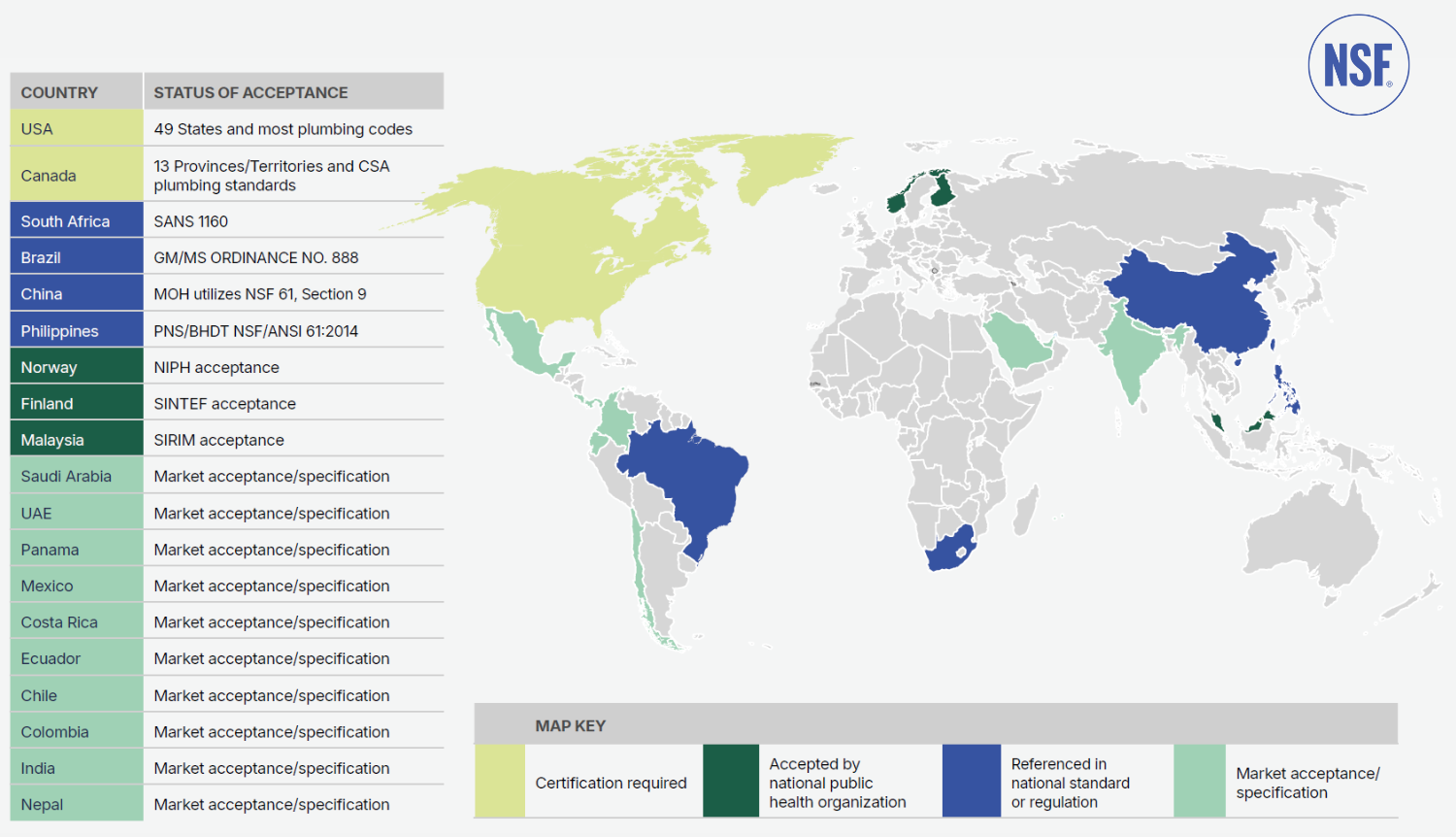NSF/ANSI/CAN 61 Testing and Certification

Purpose
NSF/ANSI/CAN 61 is a public consensus standard, which establishes minimum criteria for evaluating the health effects of materials, components, products, and systems in contact with drinking water. Products can be both tested and certified against the standard’s benchmarks.
Scope
The standard is divided into sections which cover the detailed requirements by product type.
Note: Sections 1-3 cover the scope, definitions, and general requirements.
Section | Product Type Covered |
Section 4 | Pipes & Related Products |
Section 5 | Barrier Materials |
Section 6 | Joining & Sealing Materials |
Section 7 | Process Media |
Section 8 | Mechanical Devices |
Section 9 | Mechanical Plumbing Devices |
Requirements for NSF/ANSI/CAN 61 testing and/or certification
Requirements for testing or certification to the standard vary in rigorousness from third-party certification by an accredited certification body, to market acceptance (e.g., specification by a manufacturer’s customer).
The map below shows the global scale of current requirements and acceptance of NSF/ANSI/CAN 61.

Note: Requirements and acceptance are dynamic. If you are aware of something not noted here, feel free to notify our team.
Get more information about the specific U.S. states and Canadian provinces/territories which require this standard.
Why it’s credible
The standard was first published by NSF at the request of the U.S. Environmental Protection Agency in the late 1980s. Today, it serves as a basis for drinking water requirements around the world.
NSF/ANSI/CAN 61 remains independent, as it is managed by a joint committee of 33 representatives, consisting of equal expertise in public health, end use and industry. This structure also allows the standard to be updated to adapt to new technological advancements.
Pathway to certification
The pathway to NSF/ANSI/CAN 61 certification can be broken up into seven steps.
Application
Your company submits an application (with support from our experts).Submission
You provide product formulation, toxicology, and product use information.Review
Our technical team reviews your formulations and/or parts lists to determine the testing required.On-Site Audit
We perform an on-site audit of the production facility and collect/request samples.Testing
Our laboratory conducts testing on the product.Technical Evaluation
We review the findings of the testing, audit, and compliance with the standard.Certification
If the product passes, NSF certification is granted (and maintained annually).
On-demand training on NSF/ANSI/CAN 61
You’ll leave with a better understanding of where the standard is required, its technical review, testing, audit, and ongoing surveillance requirements.
Why NSF is the best choice
- Our people know your people: We provide dedicated account managers for each client, who are in your time zone and speak your language.
- Our labs are owned and operated by us: To make sure you receive results you can rely on, NSF owns and operates our own labs. This allows us to deliver you reliable results with all the proper accreditations.
- We help protect your company from risk: We help protect your company from risk by providing you with data which can help you better understand potential risks in your product supply chain.
- You can track your project status anywhere, anytime: We provide you with access to our real-time customer platform, NSF Connect. Submit documentation, track your projects, ask questions and more.
- Our mark is known around the world: The NSF mark means quality and gives your product instant credibility. In fact, your customers are checking NSF listings to find certified products (our listings had over 400,000 views last year).

Use our NSF/ANSI/CAN 61 Readiness Tool

Book an Appointment with an NSF/ANSI/CAN 61 Expert
Share this Article
How NSF Can Help You
Get in touch to find out how we can help you and your business thrive.
